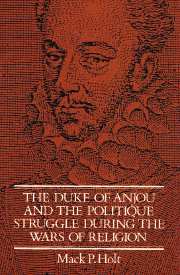Book contents
- Frontmatter
- Contents
- List of maps
- Preface
- Abbreviations
- Introduction
- 1 Prologue: civil war and the early years of François de Valois, 1555–72
- 2 From St Bartholomew's Day to the death of Charles IX, August 1572–May 1574
- 3 War and peace, May 1574–May 1576
- 4 The Estates-General and the renewal of civil war, May 1576–September 1577
- 5 Overtures from the Netherlands, September 1577–January 1579
- 6 Civil war, marriage, and more overtures from the Netherlands, January 1579–December 1580
- 7 Ménage à trois: Elizabeth, Anjou, and the Dutch Revolt, January 1581–February 1582
- 8 Turmoil in the Netherlands, February 1582–January 1583
- 9 ‘The ruin of France’, January 1583–June 1584
- Appendices
- Select bibliography
- Index
6 - Civil war, marriage, and more overtures from the Netherlands, January 1579–December 1580
Published online by Cambridge University Press: 15 December 2009
- Frontmatter
- Contents
- List of maps
- Preface
- Abbreviations
- Introduction
- 1 Prologue: civil war and the early years of François de Valois, 1555–72
- 2 From St Bartholomew's Day to the death of Charles IX, August 1572–May 1574
- 3 War and peace, May 1574–May 1576
- 4 The Estates-General and the renewal of civil war, May 1576–September 1577
- 5 Overtures from the Netherlands, September 1577–January 1579
- 6 Civil war, marriage, and more overtures from the Netherlands, January 1579–December 1580
- 7 Ménage à trois: Elizabeth, Anjou, and the Dutch Revolt, January 1581–February 1582
- 8 Turmoil in the Netherlands, February 1582–January 1583
- 9 ‘The ruin of France’, January 1583–June 1584
- Appendices
- Select bibliography
- Index
Summary
The duke of Anjou's slow retreat from Mons towards Paris in January 1579 was in part prompted by the volatile and uncertain condition of the government in the Netherlands, over which he had no control. The death of Don John of Austria in October 1578 resulted in the appointment of Alexander Farnese, prince (and later duke) of Parma, as Philip II's new governor-general. Philip II, naturally, never recognized the Dutch States-General's preference for the archduke Matthias for the position. When Don John, on his deathbed and stricken with the plague, requested that Parma succeed him, Philip consented. As far as Anjou was concerned, however, the major cause of the political instability in the Netherlands was the disintegration of the States-General. By late 1578, Holland and Zeeland had virtually withdrawn from the States and formed a state within a state. Always very independent, the States of these two provinces opposed giving freedom of worship to Catholics, despite the fact that Catholics were still a large majority there. In town after town they replaced Catholic magistrates with Calvinists by force. Moreover, they never recognized the authority of either Don John or Matthias. This new Calvinist aggressiveness, however, alienated many of the Catholics in the southern French-speaking provinces. Shocked by the violence in the city of Ghent, the provinces of Walloon Flanders, Hainaut, and Artois refused to contribute to the general war effort of the States-General in the autumn of 1578.
- Type
- Chapter
- Information
- Publisher: Cambridge University PressPrint publication year: 1986

